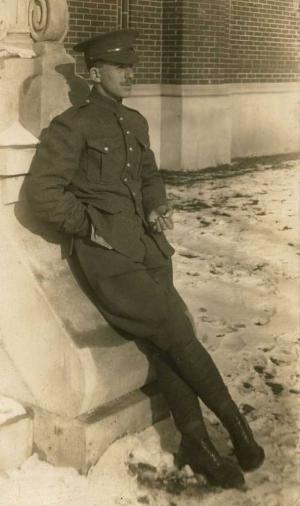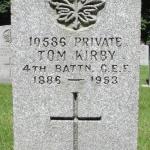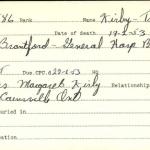BX May 1, 1915
Pte. Bob McCartney, Pte. Tom Kirby and Pte. John Gaydon the Local Boys Who Were Victims of German Gases or Bullets – Pte. Napoleon Larin the Paris Representative – Very Little Information Received Regarding Their Condition
Over the wires into this city this morning came three messages to Brantford families telling of casualties to members of the Dufferin Rifles with the first Canadian contingent in France and Belgium. Pte. T. Kirby and Pte. Bob McCartney were two new names, while the official information given in The Expositor yesterday of the wounding of Pte. R. Anthony was confirmed from Ottawa. A Paris name was also added to the casualty list.
Mrs. Mary Kirby, 188 West Mill St., received a message this morning from Ottawa, stating that her son, Pte. Tom Kirby had been wounded. Pte. Tom Kirby, who resided at 55 St. Paul’s Avenue at the time that he left the city, was a military enthusiast, having been a member of the Dufferin Rifles for five years. When the call came he made necessary arrangements and left the city with the first draft to fill the vacancies in the first contingent from the Dufferin Rifles, caused by men being discharged for inability to pass the medical test. He was a single man, employed before he enlisted as a laborer. The message received by Mrs. Kirby was as follows:
April 30, 1915
Ottawa
Mrs. Mary Kirby,
188 West Mill St., Brantford
Regret to report that Pte. Tom Kirby, 10586 armorer, C. Com., 4th Battalion, officially reported wounded. Further particulars when received will be sent to you.
Adjutant-General
BX May 11, 1915
Being Well Cared For – Mrs. Kirby Receives Word from Hospital Regarding the Condition of Her Son
The Canadian soldiers wounded in recent fighting are apparently being very well looked after. Mrs. Kirby, West Mill Street has received a letter from May Bradford, at the 13th Stationary Hospital, Boulogne, telling her that her son, Pte. Tom Kirby, who was wounded in the fighting around Ypres, is doing quite as well as can be expected. Apparently Miss Bradford is one of the Canadian young ladies who went to the front to be of assistance to wounded soldiers, in writing letters and in other ways acting for their comfort. Miss Marjorie Wilkes, of this city is in England on the same errand.
The letter was as follows:
April 24, 1915
13th Stationary Hospital,
Boulogne, Ward Six,
Dear Mrs. Kirby,
Your son, 10586, Tom Kirby, armorer, came into this hospital this morning, suffering from a head wound of a serious nature, but he is so far doing very well, quite as well as can be expected and I trust will do well. I will write again, He sends his love.
Yours faithfully
May Bradford
BX June 21, 1915
Three Wounds in Head, Loneliness Overwhelms Him – Brantford Soldier With Hole in Throat and a Fractured Jaw, Makes a Plea For Letters From His Friends in Brantford – Is Cheerful Under Great Difficulties
Three bullets in the head one of which went through his skull and out through his throat, another fracturing his jaw and a fourth going through his stomach, was the “under fire” experience of Pte. Tom Kirby, son of Mrs. Kirby, 8 St. Paul’s Avenue. These however, he does not mind so much as the loneliness which surrounds him in the big British military hospital at Netley. “The other patients get welcome visitors and parcels, but we poor Canadians get neither,” he says, making a pathetic plea for letters from his friends here. With a right arm put out of action, through the skull wounds, he cannot write much himself, but letters would be welcomed by him. The letter devoid of purely family matters was as follows:
June 3, 1915
10586 Pte. Tom Kirby
Hut 16, British Red Cross Hospital,
Battery
Dear Mother,
Your letter reached me at the above address and I must say I have been anxiously awaiting it, as I did not know how you would take it receiving the news from a stranger. I am progressing favorably, but necessarily very slowly, as my lower jaw was badly fractured and I keep moving it. Enclosed find two pictures, which will show you that I am improving. The small one was taken when I was pretty bad and the group a week or ten days ago. I guess you will know which is me in the group, in spite of the trimmings and swellings. I am sending you these pictures to let you see that, although my face is badly twisted and will remain so, it is all there.
Now to explain the manner in which I was wounded. I got four bullets, three in the head and one in the stomach but the one in the stomach was not serious. Of the other three, one went in the left hand top side of my head; another went in the top close to it and passed down behind my left eye through the roof of my mouth and tongue and out through my throat on the right side. Another went crossways and very effectively fractured my lower jaw. The top of my head has healed up and at present I have a hole in my throat which is discharging freely, and am waiting for my jaw to unite, which seems to be the last thing it wants to do.
Up to now, I have had two operations and I expect another any time, but don’t be scared, I shall be alright as I have the smartest surgeon for a doctor. He is Mr. Nitch of Harley Street, London. Please let all the folks know all these particulars as I cannot write myself (one of the bullets in the head deprived of the temporary use of my hand) and I don’t want to trouble my friend in the next bed to write this rigmarole so many times.
Yours is the first and only letter that I have received up to now, so please tell the folks they can write to me and I shall be glad to hear from them, as it is rather lonely here. The other patients get welcome visitors and parcels, but we poor Canadians get neither.
Now good-bye and remember me to all who enquire about me. Fondest love, from your loving son,
Tom
P.S. – Don’t forget to write quick and tell everyone else to write, also don’t lose track of my thick ring.
Pte. Tom Kirby
BX July 23, 1915
Almost Blind Lost One Arm – Pte. T. Kirby, West Mill Street, Pays the Price For Serving His Country
Relatives and friends who have been writing letters to Private Thomas Kirby, who left Brantford with the first Dufferin Rifles overseas contingent, have been quite anxious about him as no replies to their letters have been received for some time past.
Their fears were indeed not groundless for on Tuesday of this week Mrs. Kirby, who resides at 8 St. Paul’s Avenue, received a letter from her son, Pte. Thomas Kirby, stating that he now lies seriously wounded in the Netley hospital for Canadians, having lost the use of his right arm and what is still worse has gone almost totally blind. Little wonder is it that his friends in Brantford had failed to hear from him for so long a time. Pte. Kirby was a well-known Dufferin Rifles man, having served for five years in the ranks here before he volunteered for service.
BX April 3, 1916
Pte. Tom Kirby On His Way Home – Arrived at St. John on the S.S. Missanabie This Morning
That her son, Private Tom Kirby of the 12th Overseas Battalion was being invalided home and had arrived at St. John on the S.S. Missanabie, which docked there this morning, was the word received today by Mrs. M. Kirby, of 8 St. Paul’s Avenue. The “Missanabie” sailed from England on March 25.
Pte. Kirby left Brantford with the draft from the 38th D.R.C. in the 1st Contingent. He was wounded at the Battle of Langemarck about the 24th of April. Just about the time he was wounded he was transferred to the 12th Battalion from the 4th Battalion, and now appears in records as being connected with the 12th.
Since he was wounded in April a year ago Pte. Kirby has not been able to eat a bite of solid food, having to be fed through tubes. His injuries were numerous and serious. He received a bullet through the brain and had his jaw fractured.
BX April 8, 1916
Returned Soldiers
Three more Brantford heroes who have been invalided home are expected in the city on the 7.32 G.T.R. arriving here from Toronto tomorrow evening. The men are Privates T. Phillip, T. Kirby and W. Steed. These men arrived home on the Missanabie and will arrive in Toronto from Quebec tomorrow morning. They will be met at the station by the Soldiers’ Aid Commission and taken to their homes.
BX April 10, 1916
Royal Reception Tendered to Four Invalided Heroes Who Returned Home Sunday – Privates T. Kirby, William Steed, T. Phillips and Edgar Ree Welcomed After Their Hunt of the Huns in Flanders – Were Taken to Brant Recruiting Rally and There Tendered an Official and Informal Welcome Home – How They Met Their Injuries
Pte. Tom Kirby, 8 St. Paul’s Avenue
Pte. William Steed, Park Road, Echo Place
Pte. Thos. Phillip, 18 Grant Street
Pte. Edgar Ree, 55 St. Paul’s Avenue
Invalided home through injuries sustained, these four Brantford heroes arrived in the city last evening. Three of them, Privates Steed, Phillips and Ree, arrived on the 7.32 G.T.R. from Toronto, while Pte. Kirby slipped into the city an hour earlier. All four responded to their Empire’s call for men in the early stages of the war. Now, through injuries sustained in the fight with the Huns, they have been rendered unfit for active service.
Although it was Sunday evening and no formal reception was prepared, the boys were given a splendid welcome home. It had been arranged that representatives of the Soldiers’ Aid Commission would meet them with cars, but Bandmaster Bartram of the 125th band was also on hand with the band. During the evening three of the heroes were taken to the Brant Theatre and part of the evening was given over to a “welcome home.”
Right to the minute the G.T.R. train bringing them home pulled into the station, surrounded by thousands of citizens. Willing hands, amidst much cheering, helped the boys to the waiting automobiles and with the 125th band in the lead, a parade was formed, which wended its way up Colborne and Dalhousie Streets to the Brant theatre, where the street was thronged with hundreds of people who were bent on getting into the recruiting rally.
Here the automobiles were stopped and Ald. J.S. Dowling announced that after the returned heroes had been taken home and had partaken of a lunch they would be brought back to the theatre, where a public reception would be given them. Then amidst thunderous cheers the cars carried them to their homes.
An Official Welcome
Just as soon as the crowd could be appeased, Ald. J.S. Dowling, chairman of the Soldiers’ Aid Commission, officially welcomed the boys back. He told how tired and nerve-wracked the boys were and that their desire was not to say anything, although the reception was appreciated. Ald. Dowling pointed out the nature of the work of the Soldiers’ Aid and told men who had not gone but were thinking of it that their future would be well looked after by their country.
Cheers followed and during a selection by the massed bands of the 84th and 125th Battalions the three heroes slipped off the stage back to their waiting friends.
Ushered Into Theatres
About half an hour later accompanied by their friends, three of the heroes, Privates Kirby, Steed and Phillips, returned and were ushered to boxes in the theatre. Pte. Ree was not any too well and asked to be excused from the reception.
When the curtain was raised after the thrilling picture was concluded, the three heroes were seated on the platform. To the big portion of the crowd, the announcement of ex-Mayor Spence that the heroes were on the platform came as a surprise. This announcement was greeted with cheer after cheer that rocked the theatre.
Pte. T. Kirby
Slipping away from the rest of the local boys in Toronto, Pte. Tom Kirby, who was seriously wounded at the battle of Langemarck, arrived in the city about 6.42. Not till the rest of the boys arrived, was it known by the Soldiers’ Aid that he had arrived. He was then brought to the recruiting rally and took his place on the platform.
Pte. Kirby left Brantford with the First Contingent and went through a number of the big battles with the 4th Battalion. The battle of Bois Grenier, which he was through, he describes as a picnic. In this, he says, they were on duty for four days at a time and not a shot fired. He was also through the battle of Ypres and Langemarck. At the battle of Neuve Chapelle they stood to, but were not needed. It was on April 24, 1915 that Pte. Kirby was wounded and since that time he has been unable to eat any solid food. He was shot through the brain and also had his jaw fractured.
While Pte. Kirby showed the effects of his wounding he has improved wonderfully. Last evening he was able to talk to a reporter.
BX May 23, 1919
May Go Back
Tom Kirby, formerly of the city hall staff, who some time ago underwent his 24th operation since he was wounded in the second battle of Ypres, may have to return to Toronto for still another operation. Adjustments have been found necessary, and Mr. Kirby is gaining strength for what is hoped will be a comparatively light affair as compared with what he has previously undergone. It is stated that the operation to the head, where the German bullet came out, was a success in every way, but the plate in the jaw-bone, recently put in has fallen down, necessitating adjustment by the surgeons. The veteran is cheerful and bright, and is glad to meet his old friends at Commercial Chambers, where he is convalescing at present.



